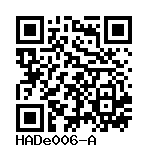HAD 6
The cell line is not validated yet.
HADe006-A
General
Cell Line |
|
| hPSCreg name | HADe006-A |
| Cite as: | HADe006-A (RRID:CVCL_C077) |
| Alternative name(s) |
HAD 6
|
| Cell line type | Human embryonic stem cell (hESC) |
| Similar lines |
CBRCULi015-A (GM23375-1, GM23375 clone 1) Donor's gene variants: DMPK – DM1 protein kinase, DMPK – DM1 protein kinase Donor diseases: Congenital Myotonic Dystrophy CENSOi008-A (FB77R2c3, CENSOi260) Donor's gene variants: DMPK, DMPK Donor diseases: myotonic dystrophy type 1 |
| Last update | 8th February 2022 |
| User feedback | |
Provider |
|
| Generator | Hadassah University Hospital (HAD) |
| Owner | Hadassah Human Embryonic Stem Cell Research Center |
| Distributors | |
| Derivation country | Israel |
External Databases |
|
| Cellosaurus | CVCL_C077 |
| Wikidata | Q54872335 |
| BioSamples | SAMEA12616337 |
General Information |
|
| Publications | |
| * Is the cell line readily obtainable for third parties? |
Yes Research use: allowed
Clinical use: not allowed
Commercial use: not allowed
|
Donor Information
General Donor Information |
|
| Sex | unknown |
Phenotype and Disease related information (Donor) |
|
| Diseases | A disease was diagnosed.
|
External Databases (Donor) |
|
| BioSamples | SAMEA6621258 |
Ethics
| Was the embryo established purely for research purposes? | No |
| Have both parents consented to the use of the embryo for ESC derivation? | Yes |
| Has informed consent been obtained from the donor of the embryo/tissue from which the pluripotent stem cells have been derived? | Yes |
| Was the consent voluntarily given? | Yes |
| Has the donor been informed that participation will not directly influence their personal treatment? | Yes |
| Can you provide us with a copy of the Donor Information Sheet provided to the donor? | Yes |
| Do you (Depositor/Provider) hold the original Donor Consent Form? | Yes |
| Please indicate whether the data associated with the donated material has been pseudonymised or anonymised. | anonymised |
| Does consent explicitly allow the derivation of pluripotent stem cells? | Yes |
| Does consent prevent CELLS DERIVED FROM THE DONATED BIOSAMPLE from being made available to researchers anywhere in the world? | No |
| How may genetic information associated with the cell line be accessed? | Controlled Access |
| Will the donor expect to receive financial benefit, beyond reasonable expenses, in return for donating the biosample? | No |
| Has a favourable opinion been obtained from a research ethics committee, or other ethics review panel, in relation to the Research Protocol including the consent provisions? | Yes |
| Name of accrediting authority involved? | Hadassah IRB Committee |
| Approval number | 16-23.04.04 |
| Has a favourable opinion been obtained from a research ethics committee, or other ethics review panel, in relation to the PROPOSED PROJECT, involving use of donated embryo/tissue or derived cells? | No |
hESC Derivation
| Date of derivation | 2007-03-24 |
| Supernumerary embryos from IVF treatment? |
No
Other hESC source:
IVF
|
| PGD Embryo? |
Yes |
| Derived under xeno-free conditions? |
No |
| Derivation under GMP? |
No |
| Available as clinical grade? |
No |
Culture Conditions
| O2 Concentration | 4 % |
| CO2 Concentration | 5 % |
| Medium |
Other medium:
Base medium:
Main protein source: Serum concentration: % |
Characterisation
Analysis of Undifferentiated Cells
| Marker | Expressed | Immunostaining | RT-PCR | Flow Cytometry | Enzymatic Assay | Expression Profiles |
| Alkaline Phosphatase |
Yes |
|
||||
| POU5F1 (OCT-4) |
Yes |
|
Genotyping
Karyotyping (Cell Line) |
|
| Has the cell line karyotype been analysed? |
Unknown
|
Other Genotyping (Cell Line) |
|


Login to share your feedback, experiences or results with the research community.